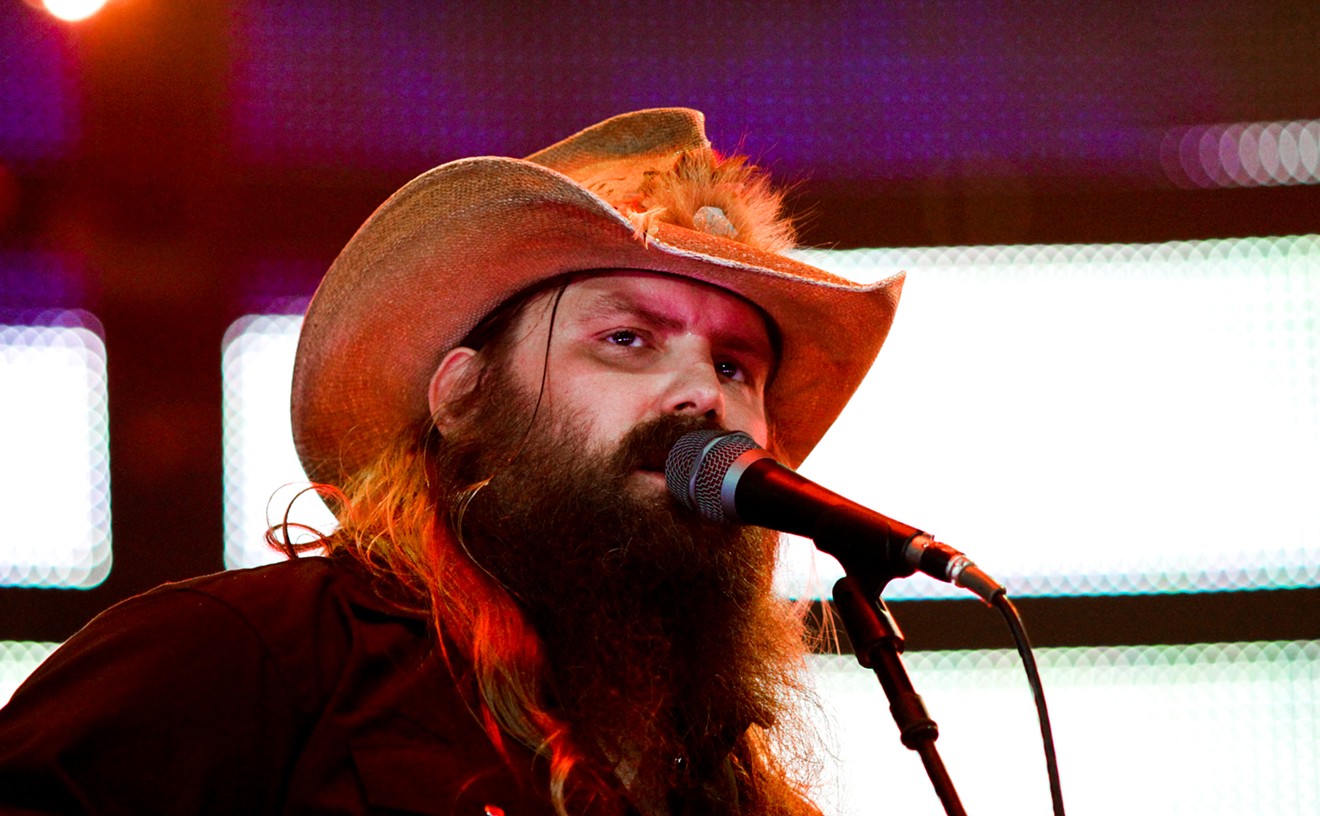Chris Stapleton
Houston Livestock Show and Rodeo
March 9, 2017
The biker beard. The cowboy hat with feathers and a turquoise jewel, like Johnny Paycheck might have worn. The slow-cooked Southern sound, bubbling up from Memphis, Muscle Shoals and the first two Lynyrd Skynyrd albums. This is Chris Stapleton, first-time RodeoHouston entertainer, who absolutely hypnotized an announced crowd of 72,803 Houstonians Thursday night.
It was something to see all right. Stapleton came along when fans who prefer the old ways had abandoned country music to the wannabe pop stars and worse, wannabe rappers. He came from, of all places, the other side of Nashville’s aisle, as a successful songwriter for hire, by way of Kentucky and a pretty great bluegrass band called the Steeldrivers, the source of the jailhouse blues “Midnight Train to Memphis” in Thursday's set. After his dad died, he cut a record called Traveller, which is still in country's Top 10 nearly two years after its release, and the rest is just more evidence for Chuck Berry’s old line: Goes to show you never can tell.
Stapleton’s songs are not cries for rebellion or even odes to partying out at the lake, but pleas to hold on to love and tough it out when things threaten to hit the skids. Others are about the seductions and sacrifices of a life spent writing and singing songs. For him, an “Outlaw State of Mind” means celebrating the things that unite us as Americans — good whiskey and roll-your-owns, and biggest of all the way outlaws “don’t give a damn all the time.” That and the stars-and-stripes background graphics for much of the night made this the most patriotic rodeo show I think I've seen yet, all the more so because nobody even felt the need to mention the flag from the stage. They simply honored it by playing in front of it.
As one might expect, Stapleton also honors his ancestors with his music: Skynyrd, the Stones, Merle Haggard, Duane Allman especially — Stapleton’s guitar on “I Was Wrong,” the heaviest blues of the night, was transporting — but also, never forget, the anonymous musicians playing for tips in neon-clouded sports bars all over America. They may not have anywhere near the kind of talent he does, but you know Stapleton sees a little of himself in them, too. They play because they can’t help themselves; neither can he. Listening to him play, you just know.
Thursday, Stapleton’s set seldom rose above a simmer, so much the better to steep in his soulful six-string work and gruff vocals that grew anguished at a moment’s notice. His wife, Morgane, made her tambourine (or shakers) an equal partner onstage and conjured Alison Krauss’s high-lonesome vocals during their duet on the Carter Family’s “You Are My Sunshine.” "Devil Named Music" was introduced with a verse and chorus of Skynyrd’s “Tuesday’s Gone.” “Fire Away” brought back a tender memory of Houston some two years removed, when the Warehouse Live crowd was the first he ever heard singing that song back to him, Stapleton said. A little of Mickey Raphael’s guest harmonica from his January 2016 SNL appearance would have been nice, but he should be here with Willie next Saturday. One song from Stapleton's new album(!), a garage-y rocker(!!) called “Second One to Know,” got its live world premiere.
The set felt so complete it was hard to imagine anything was missing, although a few songs ended right when it felt like they were just about to really get off the ground. Stapleton didn’t even play one of his biggest hits, “Parachute.” It wasn’t missed. Instead he closed with “Tennessee Whiskey,” originally recorded by David Allan Coe in 1981 and also claimed by George Jones two years later. (Its co-author, Dean Dillon, will be at the Mucky Duck next Thursday.) Stapleton and his band, him and Morgane and a rhythm section that could have easily found work at Stax or FAME Studios in the ’60s, caressed each phrase the way smart people would a glass of bourbon or a lover.
The effect was about like what happens when you get a glass or two of that stuff in you. The people on both sides of me, probably separated in age by 50 years, sat transfixed, preserved in a different kind of amber. I was no different. For a period of time that seemed like it would never end while it was happening, but painfully brief after it was over, a devil named music had taken our lives.
Support Us
Houston's independent source of
local news and culture
account
- Welcome,
Insider - Login
- My Account
- My Newsletters
- Contribute
- Contact Us
Chris Stapleton Makes Stunningly Soulful Rodeo Debut
[
{
"name": "Related Stories / Support Us Combo",
"component": "11591218",
"insertPoint": "4",
"requiredCountToDisplay": "4"
},{
"name": "Air - Billboard - Inline Content",
"component": "11591214",
"insertPoint": "2/3",
"requiredCountToDisplay": "7"
},{
"name": "R1 - Beta - Mobile Only",
"component": "12287027",
"insertPoint": "8",
"requiredCountToDisplay": "8"
},{
"name": "Air - MediumRectangle - Inline Content - Mobile Display Size 2",
"component": "11591215",
"insertPoint": "12",
"requiredCountToDisplay": "12"
},{
"name": "Air - MediumRectangle - Inline Content - Mobile Display Size 2",
"component": "11591215",
"insertPoint": "4th",
"startingPoint": "16",
"requiredCountToDisplay": "12"
}
,{
"name": "RevContent - In Article",
"component": "12527128",
"insertPoint": "3/5",
"requiredCountToDisplay": "5"
}
]




